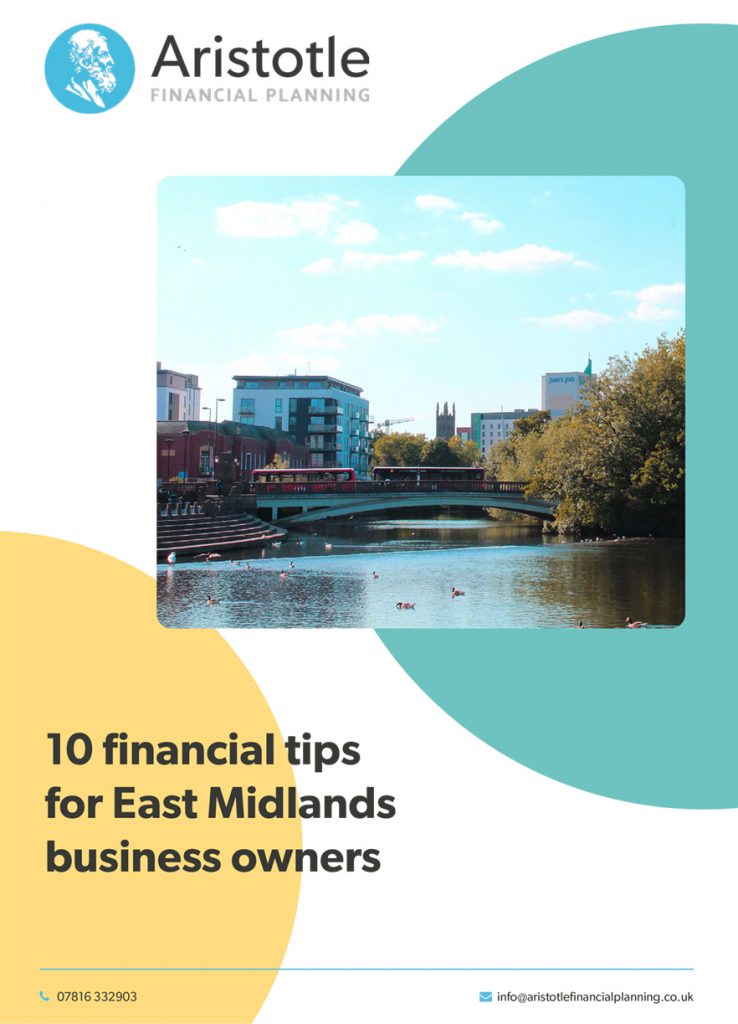Things haven’t been easy in the past year. The Covid-19 virus has impacted on even the most resilient and well-organised businesses.
As a business owner yourself, you’re rightly focused on developing and growing your company, correctly seeing it as integral to your current and future financial wellbeing.
Given the upheaval on top of the usual day-to-day stresses of running your own business, you may well have either lost sight of your wider financial strategy or relegated it in terms of priority.
There are some reasons for optimism, however. At the end of last year, the East Midlands Chamber of Commerce stated that ‘another lockdown in 2021 would pose challenges, but overall signs are high that pent-up demand should drive a strong recovery later in the year as things return to normal.’
The roll-out of the Covid-19 vaccines is another positive sign that we could soon be through the worst of things and able to look to the future with optimism.
With light at the end of the tunnel, now could be the ideal time to take a step back and look at your business finances. It’s also an opportunity to consider what steps you could take to get on a firm footing so you’re in the best possible position to benefit when things start returning to normal.
In this guide, discover ten financial planning tips that will put you on the right track and give you more time to devote to your business, your family, and yourself.
You can download a full copy of the guide by clicking ‘Download’, or you can read the guide below.
We’ll take the stress out of balancing your personal and business finances, and make sure you can live the life you want with the money you have. You can find out more about the services we offer by getting touch at info@aristotlefinancialplanning.co.uk or 07816 332903.
You and your business
It’s likely that you’re aged 35-50, and you’re working hard in your business that you’ve set up from scratch.
Because of your success, you enjoy a decent lifestyle. You own your own property (with a mortgage) and when Covid-19 allows, you have decent holidays abroad.
Most importantly, you do have some financial arrangements although it’s likely these are ad hoc arrangements you set up to meet specific needs, rather being part of a holistic plan.
Obviously, not all the criteria we’ve set out above will apply to you. But if you recognise yourself in just a couple of the assumptions we have outlined, then we think we can help you.
What You Want
You will have seen, and read about, people becoming so obsessed with their work/life balance that their health suffers, along with their relationship with their family. You want to avoid that at all costs.
You recognise the importance of down time – spending time with your family and following your hobbies – but you feel you would enjoy these far more if you knew that your finances were secure.
Above all, you’re looking for a structured financial plan which can give you the reassurance that everything is under control and your business and personal priorities are aligned.
10 financial planning tips that can give you peace of mind
Here are ten tips that can help you to improve your work/life balance and give you peace of mind.
We’re not suggesting that following these will automatically solve all your financial problems. We do believe that, along with a detailed financial plan, they will certainly put you on the right track.
They shouldn’t be too difficult to follow. Some will automatically become part of your routine – others will entail one-off actions.
Your business and family mean everything to you, so it’s essential to have coherent and robust financial plans in place for both.
‘My business is my pension’ is an adage we hear a lot. But your business should really be just a part of a much wider retirement plan to ensure you’ll be able to live a comfortable life when you do finally stop work.
You also need to consider ‘what if?’ scenarios to make sure you have a plan in place if the unexpected happens and you’re no longer able to work to provide for your family.
Once firm plans are in place, you’ve done a lot of the hard work. Going forward, all you will need to do is review them – at least annually – to check you’re still on course and make changes as required.
It’s also advisable to review your plans in the event of big changes to your business or changes in your family set-up.
Our 5-step plan for business owners
- Analyse your existing situation in line with your goals; both for your business and your lifestyle.
- Create a strategy for the future of your business, whether that’s a succession plan or a plan for sale.
- Protect your business and your family from unexpected events.
- Ensure you can afford to enjoy a fulfilling lifestyle in retirement.
- Ensure you assess your business and personal finances side by side to keep you on the right path to achieving all your goals.
Because of the time and effort you’ve invested in your business, it’s inevitable that you’ll want to prioritise this when it comes to financial decision-making.
This makes sense. After all, your business is the engine of all your other finances, so its success is essential to your future. However, it is important not to overlook your personal financial situation and make sure that you don’t neglect your family’s finances.
You should ensure you’re paying yourself a regular wage sufficient to cover all your essential outgoings and the necessary amount to safeguard your future. Your financial adviser or your accountant will be able to help you ensure you do this as tax-efficiently as possible.
You should also make sure you keep your work and home finances separate, with different bank accounts and credit cards – even if you are a sole trader.
We can work with other financial professionals, such as your accountant, to help you with tax-efficient financial planning, including the best way to take income from your business.
As well as keeping your work and home finances separate, it is also important that you keep on top of your financial affairs.
Accurate record-keeping and making sure your paperwork is in order means you will always have an up-to-date view of your financial position. This will ensure that you can always make informed financial decisions rather than leaving anything to chance.
Cashflow forecasting and scenario modelling can also help with future planning.
It’s always informative to regularly run ‘what if?’ scenarios to inform your business. These can be just as much positive scenarios as negative. For example, ‘What if interest rates went up suddenly?’ as well as ‘what if we bought new business premises?’
As a business owner you typically can’t avoid debt – but you can ensure it’s working for you and it doesn’t become an insurmountable burden.
Borrowing can supply a ready source of capital to support investment and expansion activity, as well as support through financial rough spots (such as the Covid-19 pandemic).
The availability of credit, and the borrowing rate you’re charged, will be very much dependent on your individual and business credit ratings. To avoid high interest rates, or the possibility of not being able to borrow money at all, it is essential you keep on top of personal debts and make regular repayments as necessary.
Regularly review your financial position and make debt repayment plans a priority if you feel things are getting out of control. This will help you keep a healthy credit rating and mean that future borrowing will be both accessible and cheap.
Keeping your financial records and accounts up to date, as we outlined above, should mean you’re able to anticipate your borrowing requirements in advance and be in a strong position when it comes to negotiating loans.
As we have already discussed, there’s no reason why your business can’t form part of your pension arrangements, but it’s important to look beyond that.
Your pension should be a priority.
It’s never too soon to start saving for your retirement and, if you’re already saving, you should always be looking to increase the regular amount you’re putting away – or adding additional one-off sums.
The tax relief on pension contributions makes them one of the most tax-efficient ways
of saving money. The government adds an extra 20% to any amount you personally contribute if you are a basic-rate taxpayer – that’s immediate growth of 20% without you having to do anything. Higher- and additional-rate tax relief makes pensions equally attractive for those earning more than £50,000 per year.
So, if you haven’t started putting money into a pension already, you should make it a priority – regardless of your age. Compounding – effectively growth on growth – and time in the market means money put into pension now will work hard for you over a long period.
This table shows the value of a gross contribution of £500 per month over different terms to age 65, assuming 4% investment growth each year.
| Starting age | Value at age 65 |
35 £343,756
40 £255,256
45 £182,516
Source – Calculatorsite.com
Please note that this is an example only. It does not include any fees or charges that will be payable. The actual returns will be dependent on investment performance that cannot be guaranteed. You could get back more or less than this.
As you can see, a delay of just five years in starting contributions can have a massive impact on the final fund. Five years’ contributions amount to £30,000, but that equates to a deficiency of nearly £90,000 over the same extended period.
So, there’s no time to waste if you aren’t already contributing.
Your business property
As well as making regular contributions into your pension, you could also consider taking advantage of either a Self-Invested Personal Pension (SIPP) or Small Self-Administered Scheme (SSAS), both of which provide the option of using your pension to buy your business premises so that they become an asset of your pension scheme.
There are also tax and business advantages to this kind of arrangement. By owning your premises through a pension arrangement, any rental payments you made would go straight into the pension scheme and therefore increase the scheme value. You should be aware that there are some disadvantages in using your pension to buy your business premises.
Pension consolidation
As well as ensuring that you’re paying regularly into a pension, you should also review any existing pension arrangements you may already have. These could include contributions made in a previous employment, or a personal pension arrangement you may have set up yourself.
Consolidating all the pensions you have into a single arrangement will make your pension easier to manage as you’ll just have one plan to track rather than several. It could also save you money each month through lower charges and give you a wider choice of investment funds.
However, you should be aware than pension consolidation is not necessarily the best option.
You could lose access to valuable guaranteed benefits, or discounted charges that some employers negotiate with scheme providers. It is therefore important to get financial advice before considering this.
Setting up a SIPP or a SSAS is not necessarily a straightforward process, and mistakes can prove costly, so you should speak to your financial adviser about this.
A pension is a long-term investment not normally accessible until 55 (57 from April 2028). Investments carry risk. The value of your investment (and any income from them) can go down as well as up, which would have an impact on the level of pension benefits available.
Pension investments
How you invest is important. Making the right investment decisions can make a big difference to the size of fund you build up.
You should see your pension investments very much over the long term with a timespan of at least 15 to 20 years before you retire. Even if markets do suffer a downturn during this period, there’s time for recovery.
You might wish to consider higher-risk investments with a higher potential for investment growth – more in stocks and shares and less in low-risk options such as government bonds and fixed interest.
Markets do fluctuate, but data shows that, in the long- term, stock markets will typically supply a better return than lower-risk investment options. However, the value of such investments can fall, and you could get back less than you invested.
Your ‘asset allocation’ – the amount of money you invest in each asset – will depend on your individual circumstances. Each year, it’s worth checking that your asset allocation still reflects your needs and goals and that it hasn’t become skewed by one asset performing more strongly than another.
Other investments
Saving into your pension should be your priority, but if you have the means you should also consider other investment options that can help you build your overall wealth.
Saving in an ISA is very tax-efficient so you should look to maximise your contributions as far as possible. In the 2020/21 tax year, both you and your spouse or partner can pay up to £20,000 each year into an ISA.
If you’re in the positive position of having surplus capital in your business, look to invest this. The investment choices you make should be dependent on the length of time you invest the money, and how accessible it needs to be.
We have a wealth of pension expertise. We can help you put a clear plan together, support consolidation and advise on putting your business property in your pension.
Your capital is at risk. The value of your investment (and any income from them) can go down as well as up and you may not get back the full amount you invested. Investments should be considered over the longer term and should fit in with your overall attitude to risk and financial circumstances.
Alongside investment and pension savings, you should also ensure you build an emergency fund. A very rough rule of thumb is that this should be at least three times your monthly income.
This fund should be easily accessible so you can draw on it quickly if necessary.
You should aim to protect your family against financial hardship in the event of you being unable to work through illness or incapacity.
There are two types of protection to consider:
- Income Protection will pay out a monthly sum if you are unable to work for an extended period due to ill health or injury. It gives you the reassurance that your family won’t suffer financially during the time.
- Critical Illness Cover will pay out a lump sum in the event of you suffering an illness such as cancer, a stroke or heart disease. This can give your finances a boost at a time when it is most needed.
You should also make sure you have a will in place and that it is up to date. This will ensure that your wealth will go to the people you want it to in the event of your death.
These plans typically have no cash in value at any time and cover will cease at the end of term. If premiums stop, then cover will lapse.
Understandably, most business owners don’t like to think about what would happen to their company if they became ill or died. But not putting a succession plan in place could see your hard work go down the drain and your loved ones face a huge tax bill.
We’ve already touched on the importance on having a will in place. Even if you already have one, it’s worth reviewing as there might be valuable tax planning opportunities that you haven’t taken full advantage of.
There are also two tax reliefs you should always be aware of when it comes to your business finances.
Business Relief
- This reduces the amount of Inheritance Tax (IHT) payable on the transfer of qualifying business assets. For some assets, the reduction is 100%, which means the asset is effectively exempt from IHT.
- You can get 100% Business Relief on a business or interest in a business and shares in an unlisted company. You will need to have owned the business for two years before this applies.
Business Asset Disposal Relief
- This used to be known as Entrepreneur’s Relief.
- This reduces the amount of Capital Gains Tax you must pay when you sell all or part of your business. If you qualify, you’ll pay tax at 10% on all gains on qualifying assets. You can claim a total of £1 million in Business Asset Disposal Relief over your lifetime.
Advance planning will give you the best chance of avoiding a hefty tax charge. A financial planner will take a thorough look at your personal and business assets to advise you on the best ways to protect your hard-earned wealth and property.
You should note that business taxation can be a complicated area, and we’d recommend that you seek professional assistance regarding the implications and qualifying terms of the reliefs outlined here. We can advise you on the best ways to protect your hard-earned wealth and property.
Levels, bases of and reliefs from taxation may be subject to change and their value depends on the individual circum- stances of the investor. Information is based on our current understanding of legislation which is subject to change. Information subject to 2020/2021 tax years.
At Aristotle we understand the issues you face as a business owner, because we’re business owners ourselves.
It’s a busy, complex role, and lots of people depend on you. As tempting as it can be to succumb to short- term thinking, it’s so important to ensure you have a proper plan for the future.
If you’re a business owner in the East Midlands, or further afield, we’ll work with you to design a financial plan that helps you achieve your own, your family’s and your business’ ambitions.
We’ll take the stress out of balancing your personal and business finances, and make sure you can live the life you want with the money you have.
Small business owners – Case study
Simon and Ollie were childhood friends who had a small business. After several years of consistent income, the demand for their services had increased dramatically, along with the revenue and profit produced.
Having never experienced this before, they were unsure of what to do with the levels of profits that were available.
Their goals were to…
- Learn more about how to financially manage their business profits
- Protect the business should anything happen to one of them
- Create a long-term plan for the future of the business and their personal lives.
What we did
We spent time getting to know Simon and Ollie to understand their circumstances as well as their business.
We guided them in obtaining a fair, revised business valuation and a formal agreement to protect them should anything happen to one of them. We also identified how to provide the agreed valuation should anything happen to one of them, without the need to set aside significant levels of cash.
We also worked with them to identify the most tax-efficient way to extract profits from the business and worked alongside their accountant to help them build up long-term resources for their future life.
The end results
Simon and Ollie now have complete clarity when it comes to their business and personal finances.
They’re confident that, no matter what the future holds, they have a concrete financial plan in place to protect them against all eventualities.

“James is a warm and friendly adviser with a very professional manner. He guided us through our retirement options in a straightforward way. We now feel much more confident. I would definitely recommend James.”
Clients since 2019


“James has relieved me of the burden of attempting to manage my own portfolio. We have seen highly acceptable returns, with minimal effort required on our part. I would be glad to recommend James' services.”
Clients since 2014


“James has been very supportive and helpful in explaining the financial options open to me. He is very approachable, has a friendly, professional manner, and is always very accommodating. He is always reliable and punctual.”
A client since 2015


“James provided a thorough overview of our financial situation, including how to achieve what we wanted to. We can't fault anything with James. He is very knowledgeable and sets things out in an easy to understand manner.”
Clients since 2013


“Pensions can be a minefield; I hadn’t got any idea of anything! James guided me through the process. He didn’t sugarcoat as some advisers do. He spoke to me like a real person. Very knowledgeable.”
A client since 2015


“James presented all my retirement options in a clear, jargon-free manner and put me at ease with his professional, friendly approach. I don't think there's much that he could have done any better short of acquiring a crystal ball!”
A client since 2015


“I had sold my house and didn’t know what to do with the money. I’m definitely very satisfied with the advice James gave me and continues to give me. I trust his advice implicitly and feel quite safe in the decisions we have made.”
A client since 2014


“James clearly explained our options, talked us through the processes, never talked down to us, and was very encouraging and positive. As a result, we have been able to retire earlier than we first thought.”
Clients since 2019


“James answered all our questions (we had a lot!). He’s approachable and easy to work with. Before talking to James, we had estimated an outcome. After working with him, we have a much better outcome than we ever expected. Excellent.”
Clients since 2019







 Production
Production
